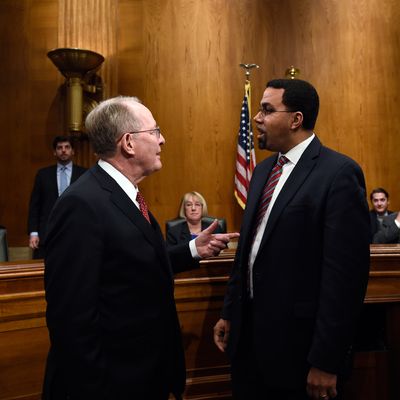
Congress is embroiled in an education policy fight that, while it revolves around esoteric policy details, profoundly clarifies the strange new battle lines on education policy that have been formed by the Obama administration’s education reforms. The debate centers on a plan to increase funding for poor public schools. In favor of the plan are the Obama administration and civil-rights groups. Standing in opposition are congressional Republicans and teachers unions. This strange collection of allies is not an anomaly. This is what the education policy fight looks like now.
The policy fight in question is an Obama administration proposal to require school districts to use Title I funds to help their poorest schools more than their richest ones. (Even within a school districts, more affluent schools often spend more per child than poorer schools.) Not surprisingly, organizations like the NAACP, the Children’s Defense Fund, and the National Council of La Raza support this idea. Also unsurprisingly, Lamar Alexander, the Republican chairman of the Senate Education Committee, opposes it. What may be surprising to some is who has joined Alexander: the two giant teachers unions, the American Federation of Teachers and the National Education Association, who have signed a letter supporting Alexander.
Why would the unions oppose a plan to shift resources to poor public schools? Because one of the reasons for the disparity in funding between rich and poor schools is the structure of teacher contracts, which tie compensation to length of tenure. As Kevin Carey explains, imposing federal requirements on how districts spend money can be “disruptive” to these existing contracts. What’s more, unions have grown deeply opposed to a stronger federal role in public education. The Obama administration has used federal education funding as a lever to drive evidence-based reforms in education. And those reforms have often changed policies unions would like to keep in place — especially the longstanding practice of teacher tenure, which pays teachers on the basis of years served (rather than how well they teach), makes replacing ineffective teachers nearly impossible, and requires that layoffs be conducted on a last-in-first-out basis.
And so unions have increasingly defined their agenda as a defense of “local control” against — though they’re too delicate to use the term — big government. Diane Ravitch, the pro-teacher union activist, has written Wall Street Journal editorials repeating the “local control” mantra, and urging Republicans to roll back Obama’s reforms. On her blog, you can find Ravitch cheering on Alexander’s challenge to Obama’s education secretary, John King and hosting columns with titles like “The Federal Government Is the Enemy of Public Schools.” If they were not being made on behalf of a union, nobody would mistake these ideas for anything other than conservatism.
The emerging alliance between teachers unions and Republicans runs against decades of built-up cultural distrust. But the interests of the two partners are closely aligned. Unions want to protect the existing contracts they have negotiated. Local control leaves those contracts in place. Federal interference has the potential to bust up those arrangements. The spectacle of unions lining up behind Alexander to oppose Obama’s plan to devote more funding to poor schools is not the first instance of this alliance in action. Unions have likewise opposed the Obama administration and civil-rights groups, siding with Republicans to demand a rollback of testing (which is a necessary tool to measure performance and disparities). The NEA’s president has already suggested she would back away from its longstanding, reflexive support for Democrats.
The rub, of course, is that existing arrangements tend to harm poor and minority students. As a lawsuit in California has found, teacher-tenure rules force poor and minority students to have a disproportionately high share of ineffective teachers. (So far, courts have disagreed as to whether the racial inequity of this arrangement rises to the level of a violation of the state constitution, but either way, it’s grossly unfair.)
Defenders of the status quo do have arguments, sort of. For instance, Laura Moser argued recently that teacher-tenure rules may be bad, but “the fight over teacher tenure is something of a red herring if you believe, as I tend to, that the real scourge of public schools isn’t bad teaching, but poverty and (re)segregation.” It is true that eliminating poverty, and finding a way to get rich and poor families to live side-by-side would do a great deal of good for the public-education system. But, on the off chance that this doesn’t get accomplished in the near term, the choice is to use the government to help poor students as effectively as possible in an unequal society, or leave them at the mercy of a system that is failing them. There’s one party that’s going to be inherently enthusiastic about having the federal government do nothing until a perfect solution can be found. And it’s not the Democrats.






























